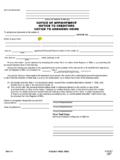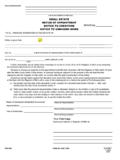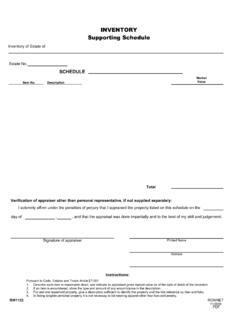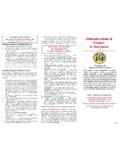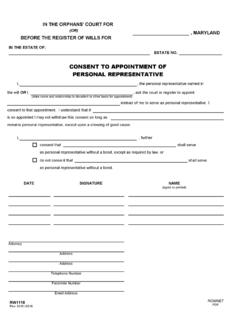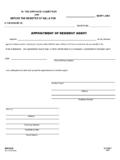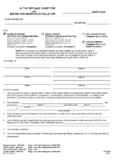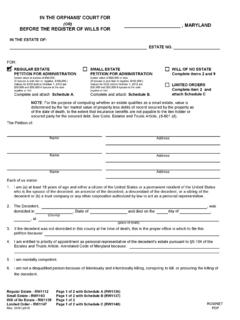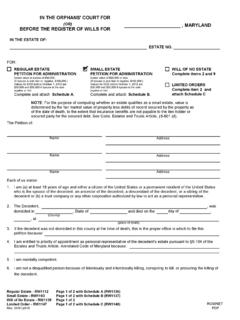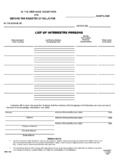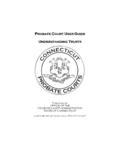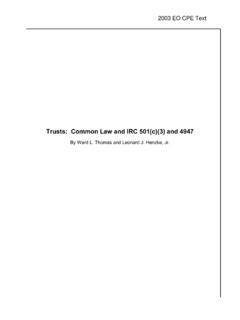Transcription of LIVING TRUSTS: GET THE FACTS
1 1 revocable LIVING TRUSTS: GET THE FACTS Articles and blog posts continue to promote revocable LIVING trusts as great estate planning tools to avoid probate and take care of your family. Some of the claims about these documents are true, others are not, and some are just confusing. This guide explains what a revocable LIVING trust is and will help you decide whether you should include one in your estate plan. WHAT IS A revocable LIVING trust ? A revocable LIVING trust (also called a revocable trust or LIVING trust ) is an arrangement you create to manage your assets during your lifetime and, like a will, to distribute those assets upon your death. A revocable trust can be a useful tool for managing your assets during any period of incapacity. It also avoids probate for the assets held in the trust , because trust assets are non-probate property. Understanding Probate Probate is the legal process to determine whether a decedent s will is valid.
2 The Register of Wills and Orphans Court then supervises the distribution of the assets the decedent owned individually at the time of his or her death, other than assets passing by beneficiary designation, pay on death designation, rights of survivorship, or held in a revocable trust . These are known as probate assets. If the decedent had a will, the assets will be distributed to the beneficiaries named in the will. Non-probate property includes life insurance death benefits, retirement plan proceeds, and jointly owned assets. These assets are not controlled by the decedent s will. Upon the owner s death, they transfer automatically to the named beneficiaries or joint owners, and thus avoid the probate process. The assets held in a revocable trust are also non-probate property. They are not subject to the terms of the decedent s will and instead transfer upon his or her death to the beneficiaries named in the revocable trust agreement.
3 The Settlor There are three parties to a revocable trust , the settlor, trustee, and the beneficiary. Typically you fill all three roles, although there may be circumstances when you would not want to serve in one role the trustee. The settlor (also called the grantor ) creates the trust . The settlor has the power to transfer property into the trust , remove property from the trust , amend or revoke the trust , and change the trustee and beneficiaries. As the settlor, you maintain these powers for as long as you are competent. The Trustee Unless you direct otherwise, you are also the trustee and continue to control your property, just as you are doing now. If you ever lose the ability to competently manage 2 your affairs, a successor trustee you have named in the trust agreement can take your place as trustee. This person would also act as the trustee upon your death. The Beneficiary During your lifetime, you are the trust s primary beneficiary.
4 The trustee manages the trust property for your benefit in accordance with the trust agreement. Upon your death, however, the trust agreement acts like a will and provides for the distribution of your assets to your beneficiaries, either outright or in further trust . As long as you transfer your assets into the trust before your death, the assets do not go through probate. ADVANTAGES OF revocable TRUSTS The advantages of incorporating a revocable trust into your estate plan include the following: Minimize or Avoid Probate. A revocable trust can help you minimize or avoid the probate process for any assets you transfer into the trust during your lifetime. As an essential part of setting up your trust , you will need to transfer (that is, retitle) your assets into the name of your revocable trust . Assets that are not retitled may still be subject to the probate process. Depending on the nature and scope of your assets, avoiding probate may, but is not guaranteed to save time and money and streamline the administration of your affairs upon your death.
5 Minimize or Avoid Ancillary Probate. If you own real estate in more than one state, having a revocable trust may enable you to avoid a separate probate proceeding, called ancillary probate, in the states where the property is located. Managing Affairs During Life. A revocable trust can be useful for someone in poor health who wants someone else to manage his or her assets. A general financial power of attorney can also serve this purpose and tends to be less complicated and expensive than a trust . It is important to note, however, that while a financial power of attorney terminates upon your death, a trustee s asset-management powers under a revocable trust continue after your death. revocable Trusts Ensure Privacy. With probate, the terms of a will and a list of the decedent s probate assets are filed on the public record. By contrast, with a revocable trust , neither the trust agreement nor the trust assets become part of the public record.
6 Still, using a revocable trust cannot guarantee that your assets will remain completely confidential. 3 DISADVANTAGES OF revocable TRUSTS While revocable trusts can be useful under certain circumstances, there are also disadvantages to consider before determining whether a trust makes sense for you. Complexity. revocable trusts are generally considered to be more complicated estate planning tools than wills. You will have to become familiar enough with the language of trusts to make good decisions regarding what you want to include in your trust agreement. If you make the effort, however, you should get an estate plan that works well for you and carries out your planning goals efficiently. Funding the trust . After you sign your revocable trust agreement, you will need to transfer your real estate, bank accounts, investment accounts, motor vehicles, and other titled assets into the trust . To do this, you will need to change title from your name to the name of your trust .
7 Some assets should not, or cannot, be transferred into your trust , and your attorney can discuss these with you. Your attorney can help you with some of this work, such as preparing a deed for your home, but funding your trust is an essential part of the process. NOTE: Failing to transfer your assets into the trust before your death will diminish or eliminate the benefits of having a revocable trust because these assets may still be subject to probate. Cost. Incorporating a revocable trust into your estate plan will cost more than a will, but it may bring about savings after your death if the trust is properly established and funded. Because of the complexities of revocable trusts, your attorney will spend more time setting one up than would likely be necessary if you used a will instead. Costs vary from attorney to attorney, so be sure to ask for an estimate before work begins. DEBUNKING THE MYTHS ABOUT revocable TRUSTS Several myths surround revocable trusts, including the following: revocable trusts reduce taxes.
8 Probate must be avoided. Only revocable trusts can be used to manage affairs and avoid guardianship. revocable trusts save time and money. revocable trusts can be used to avoid creditors. revocable trusts ensure privacy. 4 CLAIM: revocable trusts reduce taxes. FACT: revocable trusts do not save estate, inheritance, or income taxes. As the settlor, you are treated as the owner of the trust assets during your lifetime. As a result, all the income the trust assets generate is included in your income. Similarly, upon your death, the trust assets are included in your estate for federal and Maryland estate tax purposes. Strategies for minimizing Maryland and federal estate taxes (such as using the federal and state estate tax exemptions, the unlimited marital deduction, and the charitable deduction) can be incorporated into a will or a revocable trust . Thus, despite the claims of some LIVING - trust advocates, a revocable trust provides no income tax advantages while you are LIVING or estate tax advantages upon your death.
9 After your death, however, a trust that continues and does not terminate may be able to change the state which has the authority to tax the trust s income ( , from Maryland to another state). Under some circumstances, this could reduce state income taxes and may be easier to accomplish if you created the trust under a revocable trust agreement rather than a will. CLAIM: Probate must be avoided. FACT: Probate in Maryland is relatively uncomplicated in certain cases. Although some advocates of revocable trusts argue that probate must be avoided at all costs, in Maryland the probate process is usually efficient and relatively uncomplicated. There are court costs and legal fees associated with probate, but these costs are based on several variables, such as the complexity of the matter and the relationship among the interested parties. What is not quantified in dollars is the time and legwork the personal representative must dedicate to administering the estate.
10 These can be nominal or significant depending upon the nature, extent, and complexity of the estate assets. Still, the time and effort a trustee must expend administering a revocable trust may be just as significant. Probate provides certain benefits that revocable trusts do not. The Register of Wills oversees the administration process and provides notices to beneficiaries, who are given an opportunity to object. Problems that arise during administration are often resolved quickly through the Orphans Court. Maryland law now requires certain notices and reports to be provided to the beneficiaries of a revocable trust as well, with a similar opportunity to object. With a revocable trust , however, the trust administration is not supervised by any court. In addition, if a trust beneficiary challenges the actions of a trustee and is not satisfied with the trustee s response, the beneficiary must petition the circuit court to seek a resolution.
